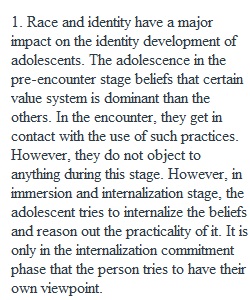


Q Name __________________________________________ Date_____________________ Handout 10-2: Reflections on My Own Rites of Passage This chapter focuses on the transition from adolescence to young adulthood and some of the factors affecting that transition. The transition from adolescence to young adulthood is a rite of passage that involves a search for identity, including ethnic/racial identity, gender identity, and social identity. Consider your own rite of passage and some of the issues discussed in this chapter. Reflect on what this transition was like for you and answer the following questions: 1. Prior to reading this chapter, had you thought about the transition from adolescence to young adulthood as a “rite of passage?” If so, in what ways? 2. In your culture, is your transition marked or celebrated by a rite of passage ceremony? Explain the ceremony. 3. The search for identity involves four statuses. Discuss each of the four in light of your experiences as you “searched” for and developed your own personal identity. 4. What impact does race/ethnicity have on the development of identity? Consider the five stages of ethnic identity development discussed in the article “Family Life and School Experience: Factors in the Racial Identity Development of Black Youth in White Communities” (Tatum, 2004)1. Can you identify with these five stages PreviousNext
View Related Questions